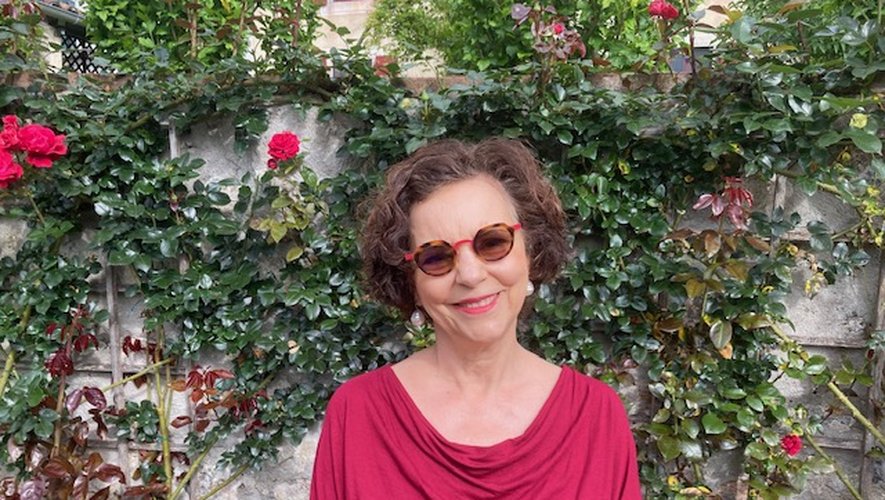Sophie Weissberg-Roquebert, whose lung cancer carrying a specific mutation was diagnosed in 2019, was treated as part of an international clinical trial thanks to a molecule, which is not yet available in France. She is campaigning for its marketing.
Sophie Weissberg-Roquebert is a survivor. Of those who give hope to those who sometimes no longer have any. At the beginning of 2019, after several months of a persistent cough, he was diagnosed with lung cancer. “The GP couldn’t find anything, because you can’t imagine you can get lung cancer when you’ve never smoked. I saw two GPs, the first told me I was coughing because that I was allergic, the second because I had sinusitis”, recalls the Toulouse retiree who now lives in the Pyrenees, far from fine particle pollution
Finally, it is her acupuncturist who will push this former teacher to have a lung x-ray. Fifteen days later, the scan results come in and Sophie immediately finds herself in the office of a pneumo-oncologist. “A terrible diagnosis”, recalls the one to whom we will explain that she has a huge tumor of 6 cm by 7 with metastases to the vertebrae. Chemotherapy soon followed, which was initially effective. But knocks her down completely. She weighs only 42 kilos and has many complications, including intestinal. And worst of all, gradually, this chemotherapy no longer works. In November 2019, his doctor told him that his chemotherapy was even going up.
“It turned out that I had somewhat particular cellular evolutions. My doctor told me that there was perhaps a more targeted treatment”, recalls the septuagenarian. She is suffering from bronchial cancer carrying a specific mutation of the MET gene.
“I have a perfectly normal life”
However, at the time, an international study had just been launched to test the impact of a new therapeutic treatment on this cancer. And the Toulouse University Hospital is participating, through Professor Julien Mazières. Sophie Weissberg-Roquebert ticks all the boxes to be included in the cohort of 313 patients selected around the world to test this new molecule called tepotinib. After a few adventures, and a late letter in the middle of Thanksgiving, she finally joined the Vision study trial, “to her great relief”.
“This targeted treatment was my lifeline, I understood that it was this or nothing. And there, the effects were very, very fast. I had to start the treatment in February-March and in the month of June I only had one scar left, it had completely regressed. It was a miracle. I have Professor Mazières repeat it twice when he said to me “you are in remission”, it was so incredible and good less difficult than chemotherapy. For me, it’s miraculous, I wouldn’t be here if I hadn’t had this treatment, “says the Toulouse woman three years later.
Today, the trial phase is over, and the results are very promising for people with this specific mutation since more than half of the patients responded positively to this treatment and saw the size of their tumor decrease. Like Sophie Weissberg-Roquebert who continues to take a pill every day. She only had one side effect, lymphoedema, basically swelling of the legs. “I have compression stockings and I have a perfectly normal life. I have the fatigue of a 70-year-old woman, except that I can no longer put on bare feet. And I’m still alive, which was not played in advance”, assures the one who today crunches life to the fullest.
Advocacy for the marketing of this molecule
“I think that if I stopped, it would start again. I do a CT scan every three months, and it says the same thing every three months: there is no evolution”, continues this patient who would like everyone those who suffer from the same cancer as her can benefit from this molecule.
But if this is the case in the United States, where the results of the Vision study have convinced the authorities that this molecule should be marketed, in France, things are more complex. “The European Medicines Agency has approved it, in Germany it is reimbursed. In France, the medicine is not approved by the High Authority for Health, so it is not reimbursed by social security. We can buy it on the Internet but it costs more than 5000 euros per month”, she explains.
In France, the placing on the market is conditioned by another phase of studies which must make it possible to compare the patients treated with this molecule and others not. A situation that prompted Sophie Weissberg-Roquebert to get involved in the Alk+ros1 France Cancer Lung association, which defends patients with rare pathologies, affecting 3 to 5% of lung cancers.
All of them are very concerned by all these targeted therapies and these promising new molecules that they would like to see put on the market. “This genetic evolution that I have, very few people have it. But the labs are looking into it, which saves our lives. They find molecules for rare cancers. If the laboratory does not provide me with the drug every day, from Germany, I won’t be here to tell you. also atrocious to say to themselves that they cannot deliver them”, she laments, hoping that one day the French protocols will evolve to offer the best possible chances to all patients.

